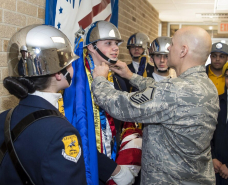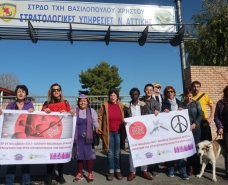Venezuela: Military in the classroom

Rafael Uzcátegui
Similarly to the other countries in Latin America, the military is the main founding myth of Venezuela. Simón Bolívar, the “father of the homeland” is remembered as a great military strategist. His figure, as a statue on horseback in a heroic gesture, or his bust, which shows his hierarchy in the so-called “liberator's army”, marks the centre of all the important cities and towns throughout the country. Militarism is a particularly important part of Venezuelan culture and national consciousness. The saying “Ecuador is a convent, Columbia a university and Venezuela a military barracks” has been attributed to Bolivar himself. For 51 years during the 21st century, this former exporter of coffee and cocoa, which were then substituted by oil as the main industry in the country, was ruled by local leaders who were “charismatic, with a vast network of contacts and with considerable and constant source of resources”. Throughout these years the main Venezuelan contribution to regional sociology was the theory of “democratic Caesarism” proposing a government based on the permanent re-election of a charismatic leader, a “necessary guardian”, assiduous to the concentration of power. A Simon Bolivar ad infinitum.
Although the Venezuelan schools, colleges and universities have always reflected the dominant ideology, as well as the notion surrounding soldiers and the military as a guarantee of efficiency over a civilian corruptible universe, there has been a renewed impetus in the intention of teaching young people in the classrooms the unique values of the armed forces. This is due to the militarisation of the presidential figure with the arrival of Hugo Chavez. The previous leader with a military background governed up to 1958.
Premilitary training
In 1981, through a joint resolution between the Ministry of Defence and the Education Ministry, it was decided that pre-military training would be implemented as a compulsory subject in secondary school in the final two years of school, before going to university. The first regions where these classes were given were in the border regions (Táchira, Zulia, Apure, Amazonas and Bolívar), but the next year other states had adopted them, such as Lara, in which the author writing these lines lived at the time.
At this time, pre-military classes were only given in state schools. And they weren't in all of them, although unfortunately they had them in the school I went to. There was a theoretical part, which was basically a summary of the history of Venezuela with an emphasis on the War of Independence and Simon Bolivar's victories. Despite this being historically false, it was and still is claimed that the Venezuelan Armed Forces are direct descenders of the military which fought for independence, which fought for the expulsion of the Spanish crown from the country. The other classes were never-ending sessions of the so called “closed order”: this involves following orders according to military customs and marching as is seen in the official marches. The final exam in the forth year consisted of unloading and loading an assault rifle in the shortest time possible. In the fifth year, we had to complete an assault course in a real army barracks. The pre-military training was considered as important as subjects such as physics, chemistry, maths or literature. Furthermore, it was held in higher esteem than other subjects such as philosophy or vocational skills like as carpentry or studies in order to become an electrician, which would be truly useful for life in society.
In 1991, with the triumph of a member of the Armed Forces winning the Venezuelan presidency, militarising trends are being reinforced in Venezuelan culture. From this year onwards, active uniformed military staff began to hold different jobs and responsibilities in public administration, including in town halls, governments and ministries. The social base is organised in such a way as to prioritise the vertical hierarchy of solidarity, as well as a “them and us” logic. In the field of education, pre-military training classes were made obligatory for both state and private schools.
One of the first books published in support of pre-military training classes confirms the antagonism existing between the army rationality and the military values of any project with a view to change society. The text “pre-military training“ by Marjorie Vásquez (Editorial Biosfera, 1999), stated: “From the seventies ... as result of our oil bonanza, (...) there began an indiscriminate and uncontrolled avalanche of immigrants from Colombia, Ecuador, Peru, the Dominican Republic, Trinidad, Cuba and other parts of Central and South America who, on the whole, did not have a formal education,were without a specific vocation, with traumas and illnesses; they have come in search of the easy Bolivarian dream, which Venezuela was offering.” Following that, the teacher recommended encouraging European immigration. The lessons on xenophobia, unprecedented for a school textbook, did not stop there. On the reason for female Latin American immigration, the author had the audacity to ask the following question on page 59, “How many of them give themselves to the highest bidder, in order to have children with them, so as legalise their residency in the country?”. The book sparked great controversy about the contents of the “pre-military” classes. However, the voices of those who called for such material to be an optional subject, were not strong enough. Marjorie Vásquez 's book was modified and the pre-military classes are still being taught today.
Teaching in the barracks
The National Experimental Polytechnic University of the Armed Forces (UNEFA) was founded in 1974 by President Rafael Caldera. The initial aim was to professionalise Armed Forces members, by teaching them in various sectors of engineering. It had three bases in just three states within the country. This emphasis changed in 1999, when president Chavez modified its status and named it the National Experimental University, which meant that from 2004, there was an increase both in terms of its size as well as academic standing. The UNEFA incorporated degrees such as hotel management, social economics, management, education and nursing, which meant that it opened its doors to people coming from the “civilian” world. The growth of this institution has been so great that the Venezuelan government has claimed that it is the university with most students, around 240,000, of any in the country.
It would be a mistake to think that having its doors open to the public, the university has changed and abandoned its military slant. The reverse is in fact the case: with the UNEFA, the world of education has just become militarised. The institution maintains its army-style discipline, and as a compulsory subject — which does not exist in any other university in the country — students are trained in military skills. The possibility of being included in the university education system means paying the price by accepting indoctrination.
The UNEFA shows itself to be proud of actively contributing to the training of the Natioanl Bolivariam Militia, the civil arm of the Armed Forces which was created when Bolivar's government was in power. According to official statistics, there are 13,000 members of the militia. The university authorities state that students join the militia on a “voluntary” basis, but is it possible to gain a degree if the students refuse to participate in the militia?
The National Bolivarian Army's supposed legitimacy is supported in article 326 of the constitution, which establishes the so-called “principle of shared responsibility of the citizens in defending the entirety of the nation”. This interpretation of this phrase has led to the creation of three types of civic-military activities: the Territorial army, the reserve militia and the combatants' corps. The difference between the militia and the combatants corps is that the latter, according to the law on the Partial Reform of the Organic Law of the Bolivarian National Armed Forces, approved in 2009, must be organised in public and private businesses of the country “thus ensuring the integrity and and operational capacity of the institutions to which they belong”. Nevertheless, the combatants' corps continue to maintain links with the educational model initiated by the so called “Bolivarian revolution”: spokesmen of institutions such as the Rómulo Gallegos University (Unerg), the Simón Rodríguez University (USR) and the Nacional Abierta University (UNA), long standing institutions of higher education which are now openly controlled by the government. They have stated their commitment to organise themselves amongst the workers within these institutions. Such a commitment with the re-strengthening of the army can, in turn, be seen in the Bolivarian University of Venezuela (UBV). Up until now there is no clear grassroots-based link between the armies, and the initiatives are isolated with scarce coordination amongst them. However, there is evidence showing that there is the desire to create a greater level of co-operation, thus creating an institution for the “integral defence” of the nation, within the education system.
Another militarist initiative by the State has been the creation of the so-called “communications guerrilla units”, which was paradoxically the brain child of a woman, the head of the government of the capital district, Jacqueline Faría, on 10 April 2010. The project involves creating units of 25 young high school students in order to tackle the issue which the government of President Chavez has called “communicational hegemony” of the private media. The teenagers were sworn in before the country's symbols and also dressed in military uniform, looking like the Latin American guerilla groups of the 1960s. They also had different instruments so as to decorate several buildings. However, this initiative did not prosper. Several human rights and social movement organisations questioned giving credibility to armed violence, whose most visible core elements were maintained up until the elections of the National Assembly, carried out on 26 September 2010. The failure of the project suggests that media guerillas had a role based on electoral propaganda, which may be seen again in the run-up to the Presidential elections of 2012.
This leads us to reflect upon the fact that Bolivarian socialism, promoted by Caracas, is not a model which critically analyses the world and prioritises the dignity of humankind. Rather, it merely confirms the prophecy made by the writer Albert Camus decades ago, “The main event of the 20th century has been the abandonment, by the revolutionary movement, of the values of liberty, the progressive regression of socialism of freedom which is being replaced with a military Caeser-like style of socialism. From this moment forth, a hope has left this world and a solitude has begun for every free man.”
Countering Military Recruitment

WRI's new booklet, Countering Military Recruitment: Learning the lessons of counter-recruitment campaigns internationally, is out now. The booklet includes examples of campaigning against youth militarisation across different countries with the contribution of grassroot activists.
You can order a paperback version here.







